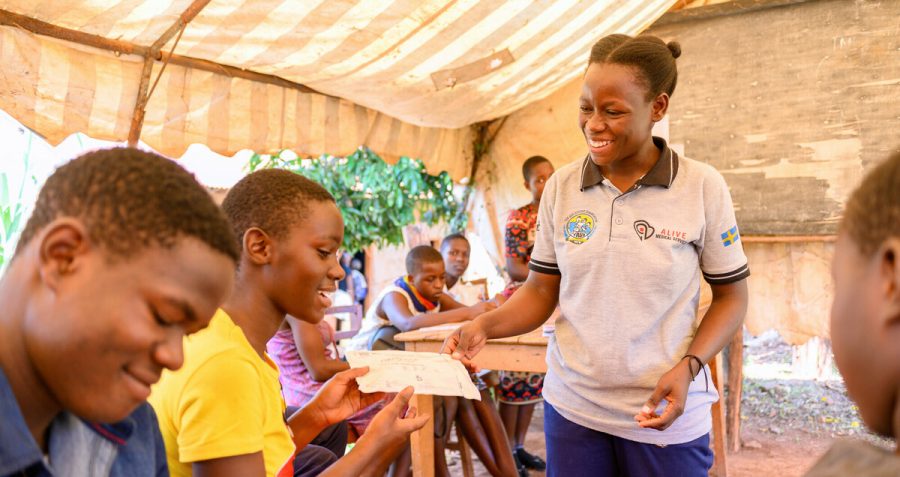Adolescent girls and young women’s economic empowerment improve HIV and SRHR outcomes

Key information
- Organisations: Youth Alive Uganda (YAU), Alive Medical Services (AMS) and The AIDS Support Organization (TASO)
- Country: Uganda
- Region: Western and Central Africa
- Stage of innovation: Stage 3: Pilot
- Start date: 2021
- End date: 2022
- Type of innovation: Service delivery innovation: new or different way of providing a service
- Funder: Frontline AIDS
Summary of intervention
Economic insecurity intersects with HIV vulnerability in multiple ways and is a driver of HIV infections. Poverty may lead to transactional sex, early and forced marriage, and affect young people’s ability to make healthy choices. Poverty also affects access to services due to costs of health services, medication and transport. According to the 2016 Uganda Demographic Health Survey, young people below 25 have lower rates of employment, which was exacerbated by the COVID-19 pandemic.
The SRHR Umbrella programme (2016–2023) addressed economic insecurity as a driver of HIV vulnerability through the self-help groups approach in Uganda. Piloted with three partners — Youth Alive Uganda (YAU), Alive Medical Services (AMS) and The AIDS Support Organization (TASO ) — vulnerable young people were recruited into self-help groups based on the village savings and loan association method. They were also trained in vocational skills, financial literacy and life skills and supported to save in groups and start businesses. Peer educators attended the 41 self-help groups, discussing SRHR issues and providing information and referrals to services.
Data from YAU, AMS and TASO demonstrate success in increasing young people’s income and improving their well-being and SRHR literacy. For example, 81% of participants in the AMS project reported good mental health and well-being at endline, up from 42% at baseline. Participants in the YAU project stated that as a result: ”I can now think and plan for my future unlike before”; “I am able to share my experience openly among my peers” and “I have gotten opportunity to get access to health services unlike before”. TASO saw a reduction in sexually active participants engaging in transactional sex from 59% at baseline to 27% at endline.
learnings
Results show that context-specific self-help groups integrating group saving, training, mental health support and SRHR support and information can reduce both economic vulnerability and vulnerability to HIV and other SRHR issues. There are large numbers of vulnerable adolescent girls and young women aged 15–24 affected by COVID-19, most of whom do not have hopes of returning to school even now schools are open. To meet demand, self-help groups with an economic empowerment component should be included in HIV and SRHR programmes targeting young and economically vulnerable people.
next steps
Based on these positive results, the approach was mainstreamed into the programme and six additional groups created. More robust evaluations of such interventions should be conducted to better measure their impact.
sustainability
The essence of this approach is to reach more people using fewer resources in a sustainable manner. To promote community ownership, local artisans were engaged to conduct the training sessions. The sustainability of these self-help groups also needs to be considered from the outset of any intervention to make sure that they can continue to function independently after the intervention ends.
Find out more about our SRHR Umbrella programme.

